KARACHI: The Pakistan stock exchange (PSX) plunged a massive 816 points on Monday — a day after the government announced a $6 billion International Monetary Fund (IMF) package — with the benchmark KSE 100 losing 2.3 percent during intra-day trading and cementing fears that investor sentiments remain bleakly uncertain.
For a few minutes when trading opened, all seemed well with upwards activity and a move into the green zone by more than 500 points before the PSX experienced one of the bourse’s worst bearish spells, pushing the index to close below 34,000 points.
“The market opened on a buoyant note before panic-prone investors started to jettison shares,” said Muhammad Faizan, an analyst and head of foreign institutional sales, Next Capital Limited, a brokerage. He said this occurred due to concerns of tough conditions attached with the IMF bailout package, leading to heavy sell-offs in the market that pushed the index to close at 33,900 points.
Pakistani authorities and the IMF team on Sunday reached a staff level agreement on economic policies to be supported by a three-year agreement for about $6 billion which is subject to IMF management approval and to the timely implementation of the Fund’s conditions.
According to Ahsan Mehanti, Chief Executive at Arif Habib Corporation, a capital market company, “Expected increase in taxes and utility prices, sharp fall in expected growth rate, projections for 6.5-7 percent fiscal deficit to GDP, and expected tightening in SBP policy rates played a catalyst role in bearish close.”
With inflation climbing to over 8 percent, the rupee losing a third of its value over the past year, and foreign exchange reserves barely enough to cover two months of exports, Pakistan was forced to turn to the IMF for its 13th bailout package last year.
Outlining critical steps Pakistan needed to take for fiscal strategy, the IMF said the upcoming budget, to be announced this month, would aim for a primary deficit of 0.6 percent of GDP supported by tax policy revenue mobilization measures to eliminate exemptions, curtail special treatments, and improve tax administration.
Economists say that impact of the IMF bailout program and the promises made to secure the money by Pakistani authorities will be reflected in this month’s budget.
“The most prominent thing in the budget would be the imposition of around Rs. 700 billion in new taxes,” according to Dr. Hafeez Pasha, former finance minister, who spoke to Arab News on Monday. “The major portion of taxes will be through the reduction of exemptions being given on many items including medicine, medical equipment and fertilizers,” he said, and added that a removal of the exemptions would hugely affect ordinary citizens.
The IMF has asked that Pakistan’s deficit be reduced to between 1-1.5 percent of GDP, which will mean a deficit of up to Rs. 750 billion will need to be curtailed.
“The problem is that what we pay in debt servicing will have to continue as there is no space for reduction. The fiscal space is available in your defense and development budgets and the choice is yours,” Pasha said.
Some experts do believe that the agreement will boost the confidence of investors and end the long prevailing uncertainty from nine months of IMF negotiations. Others say the bearish rule at the PSX is here to stay.
“The movement of currency will now be based on demand and supply bases. At the month end when debt payment nears, we will see shocks in the currency market,” Muzzamil Aslam, a senior economist told Arab News and called for the strong role of regulator.
“As per the real effective exchange rate, the Pakistani Rupee is close to its equilibrium, and there is only 2-3 percent room for further devaluation,” he said.
The IMF forecasts Pakistan’s economic growth slowing to 2.9% this fiscal year from 5.2% in 2018, while the central bank has cut its estimate to between 3.5-4%.
“If there arises any demand and supply issue and the central bank is not allowed to intervene, then the market can do anything,” Aslam said. “We could see Rs.10 appreciation or depreciation in a single day.”
Tough IMF conditions push Pakistan stocks down 816 points
Tough IMF conditions push Pakistan stocks down 816 points
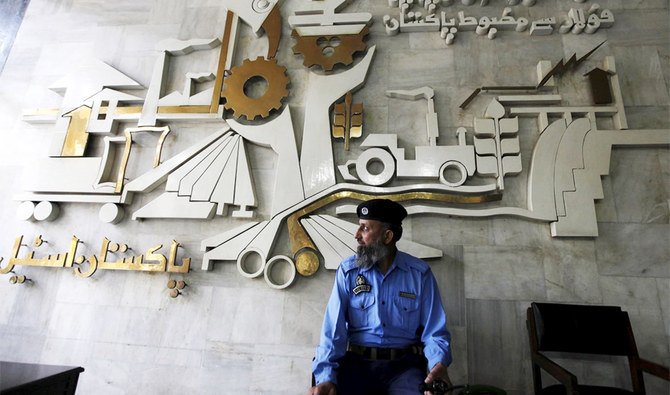
- The Pakistan Stock Exchange plunged on Monday to lose 2.3% during intra-day trading
- Defense and development are only two areas where there is fiscal space for budget cuts, economists say
PM Sharif, Saudi crown prince discuss bilateral ties and regional situation in Riyadh
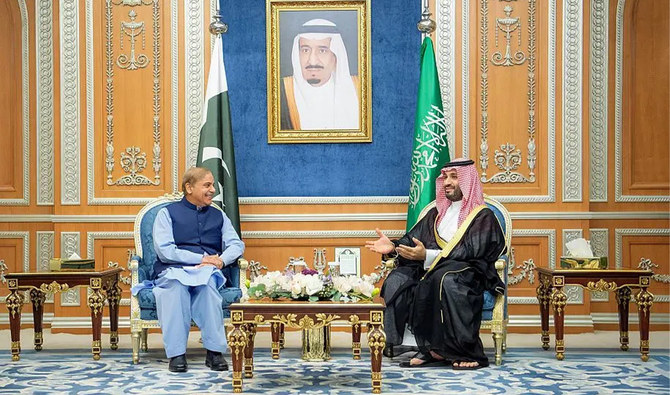
- PM Sharif attends Special Dialogue and Gala Dinner hosted by Saudi crown prince in Riyadh
- Sharif is in Riyadh to attend two-day World Economic Forum meeting, engage with world leaders
ISLAMABAD: Prime Minister Shehbaz Sharif met Saudi Crown Prince Mohammed bin Salman in Riyadh on Sunday evening during which the two leaders discussed bilateral relations between Pakistan and Saudi Arabia, the regional situation and Israel’s war on Gaza, Sharif’s office said in a statement.
Sharif, who arrived in Riyadh on Saturday to attend a two-day special meeting of the World Economic Forum, attended a Special Dialogue and Gala Dinner hosted by the Saudi crown prince in Riyadh. Sharif congratulated the Saudi crown prince for successfully organizing the WEF Special Meeting, the Prime Minister’s Office (PMO) said.
“The Prime Minister conveyed his prayers and good wishes for the health, happiness and long life of The Custodian of the Two Holy Mosques His Majesty King Salman bin Abdulaziz Al Saud,” the PMO said. “In addition to bilateral ties, the regional situation, particularly with regards to the crisis in Gaza, was also discussed.”
Sharif thanked the Saudi crown prince for sending a high-powered delegation, headed by Saudi Arabia’s Foreign Minister Minister Faisal bin Farhan, to Pakistan earlier this month. The delegation held key meetings with Pakistani ministers and businesspersons to enhance economic cooperation between the Kingdom and the South Asian country.
“To continue the discussion, the Prime Minister said that he has brought with him a high-powered delegation to Riyadh, including key Ministers responsible for investment, so that follow-up meetings could take place between relevant officials,” the PMO said.
Sharif reiterated his invitation to the Saudi crown prince to undertake an official visit to Pakistan at his earliest convenience, the PMO added.
Separately, Sharif met Saudi Arabia’s ministers of finance, investment and industry on Sunday at the sidelines of the WEF meeting. In his meeting with the Saudi finance minister, the two sides agreed that Saudi Arabia would explore more opportunities for investment in Pakistan.
Saudi Finance Minister Mohammed Al-Jadaan reiterated the Kingdom’s support for Pakistan’s economic development, Sharif’s office had said in a statement.
Pakistan and Saudi Arabia enjoy strong trade, defense and cultural ties. The Kingdom is home to over 2.7 million Pakistani expatriates and serves as the top source of remittances to the cash-strapped South Asian country.
Both Pakistan and Saudi Arabia have been closely working to increase their bilateral trade and investment, and the Kingdom recently reaffirmed its commitment to expedite an investment package worth $5 billion discussed previously with Islamabad.
Gunmen kill two laborers from Punjab province in southwest Pakistan — official
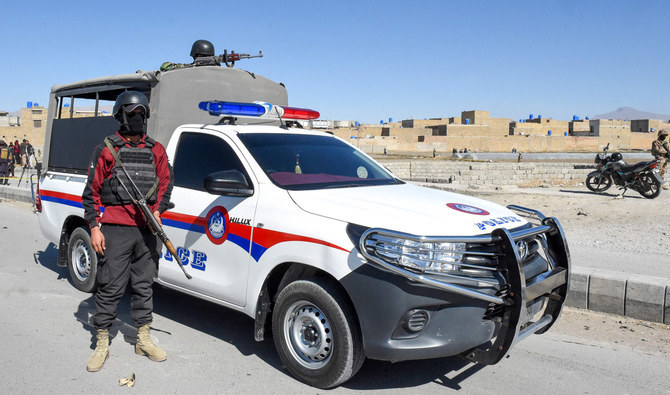
- The two laborers were working inside a garage in Tump area of Balochistan's Kech district when they came under attack
- No group immediately claimed responsibility, but Baloch separatists have previously targeted people from other provinces
ISLAMABAD: Unidentified gunmen on Sunday shot dead two laborers, who hailed from the eastern Punjab province, in the country's restive Balochistan province, a local official said.
The two laborers were working inside a garage in Tump area of Balochistan's Kech district when they came under fire by gunmen riding motorbikes, according to Saeed Umrani, commissioner of Makran Division where Kech is located.
No group immediately claimed responsibility for the attack, but Baloch separatists have previously targeted people from other provinces on suspicion of spying for state agencies.
"Both laborers, who were residents of the Punjab province, were killed on the spot," the official said.
Umrani said bodies of the deceased had been sent to their hometowns and the district administration was hunting for the perpetrators.
The attack came two weeks after armed men abducted nine passengers, who hailed from Punjab, from a bus and killed them near Balochistan's Noshki district.
The outlawed Balochistan Liberation Army claimed responsibility for the attack, saying it had information that plain-clothed spies were on the bus. The group offered no evidence to support its claim.
Balochistan has been the scene of a long-running insurgency by separatist militants who seek independence from the central government in Islamabad.
Although the government says it has quelled the insurgency, violence has continued to persist in the province.
Pakistan PM, Kuwaiti emir discuss transformation of bilateral ties into economic partnership
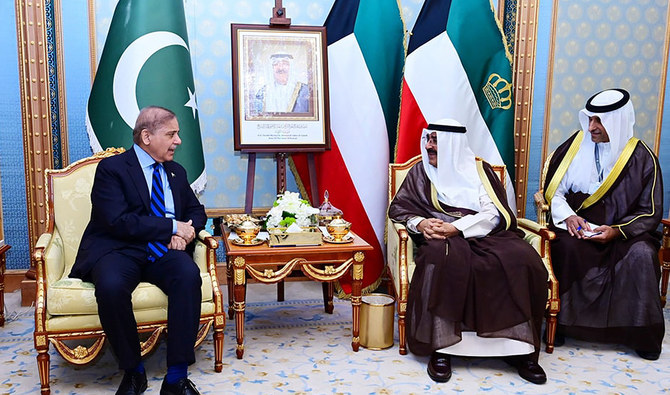
- The meeting came on the sidelines of a two-day World Economic Forum summit in Riyadh
- PM Shehbaz Sharif assured of efficient implementation of Pakistan-Kuwait deals signed in Nov.
ISLAMABAD: Pakistan Prime Minister Shehbaz Sharif on Sunday met with Emir of Kuwait Sheikh Mishal Al-Ahmad Al-Jaber Al-Sabah in Riyadh and discussed with him transformation of Pakistan-Kuwait ties into an economic partnership, Sharif’s office said.
The meeting came on the sidelines of a two-day World Economic Forum (WEF) summit on global collaboration, growth and energy on April 28-29.
PM Sharif thanked Sheikh Mishal for his congratulatory letter upon his re-election and congratulated him on assuming the role of the emir of Kuwait.
“The Prime Minister expressed his desire to work closely with His Highness to transform bilateral ties into a mutually beneficial economic partnership that would serve the best interests of the peoples of both countries,” Sharif’s office said in a statement.
The development came months after Pakistan and Kuwait signed several trade and investment agreements worth $10 billion during the visit of caretaker Pakistan PM Anwaar-ul-Haq Kakar to the Gulf country.
Besides these agreements, the two countries had signed three memorandums of understanding (MoUs) in the fields of culture, environment and sustainable development.
Pakistan’s army chief, General Asim Munir, had also accompanied the caretaker prime minister on the Kuwait visit in November, which was part of the Pakistani leadership’s ambitious plan to attract investment from the Middle East amid an economic slowdown at home.
“The Prime Minister assured the Kuwaiti leadership that these MoUs and agreements would be implemented in an efficient and timely manner,” the statement added.
“In addition to bilateral ties, the regional situation, particularly with regards to the crisis in Gaza, was also discussed.”
PM Sharif, IMF chief discuss Pakistan’s new loan program on WEF sidelines in Riyadh
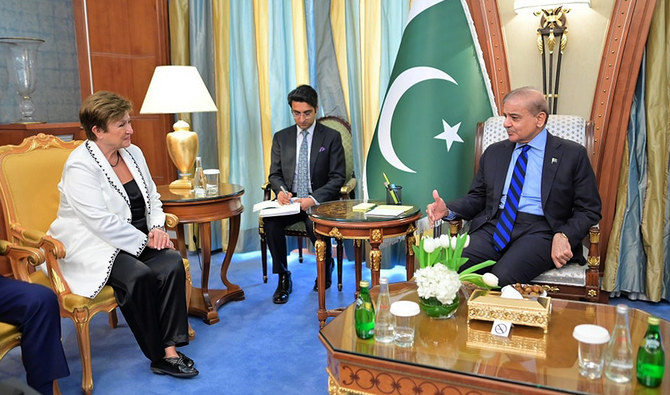
- Pakistan’s $3 billion IMF loan program, which helped Islamabad avert a default last year, is due to end this month
- Pakistan faces a chronic balance of payments crisis, with nearly $24 billion to repay in debt over next fiscal year
ISLAMABAD: Pakistan Prime Minister Shehbaz Sharif on Sunday met with International Monetary Fund (IMF) Managing Director Kristalina Georgieva in Riyadh, where the two figures discussed a new loan program for the cash-strapped South Asian country, Sharif’s office said.
The meeting between PM Sharif and the IMF managing director took place on the sidelines of a two-day World Economic Forum (WEF) summit on global collaboration, growth and energy in the Saudi capital on April 28-29.
Sharif thanked Georgieva for her support to Pakistan in securing a $3 billion IMF loan program last year that is due to expire this month. The IMF executive board is expected to meet on Monday to decide on the disbursement of the final tranche of $1.1 billion to Pakistan.
“MD IMF shared her institution’s perspective on the ongoing program with Pakistan, including the review process,” PM Sharif’s office said in a statement.
“Both sides also discussed Pakistan entering into another IMF program to ensure that the gains made in the past year are consolidated and its economic growth trajectory remains positive.”
Sharif informed the IMF chief that his government was fully committed to put Pakistan’s economy back on track, according to the statement.
He said he had directed his financial team, led by Finance Minister Muhammad Aurangzeb, to carry out structural reforms, ensure strict fiscal discipline and pursue prudent policies that would ensure macro-economic stability and sustained economic growth.
Pakistan secured the $3 billion IMF program in June last year, which helped it avert a sovereign default. Islamabad says it is seeking a loan over at least three years to help achieve macroeconomic stability and execute long-overdue reforms.
Finance Minister Aurangzeb has said Islamabad could secure a staff-level agreement on the new program by early July, though he has declined to detail what size of the program it seeks. If secured, it would be Pakistan’s 24th IMF bailout.
The $350 billion South Asian economy faces a chronic balance of payments crisis, with nearly $24 billion to repay in debt and interest over the next fiscal year — three-time more than its central bank’s foreign currency reserves.
Pakistan’s finance ministry expects the economy to grow by 2.6 percent in the fiscal year ending in June, while average inflation for the year is projected to stand at 24 percent, down from 29.2 percent the previous fiscal year.
Saudi ministers assure PM Sharif of support for Pakistan’s development — PM’s office
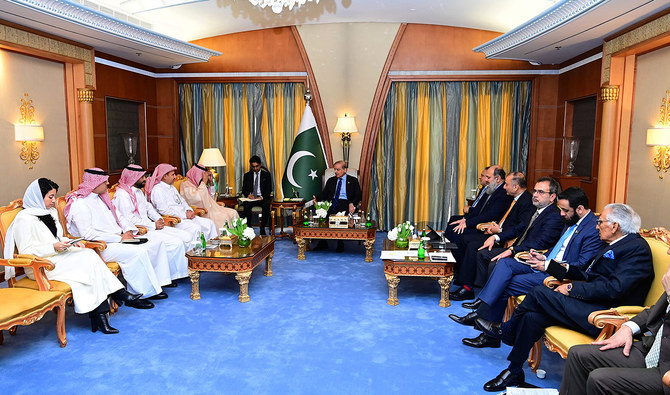
- PM Shehbaz Sharif is in Riyadh to attend WEF meeting on global collaboration, growth and energy
- On Sunday, he met with Saudi Arabia’s minister of finance, investment, and industry and minerals
ISLAMABAD: Prime Minister Shehbaz Sharif on Sunday met with Saudi Arabia’s ministers of finance, investment and industry in Riyadh on the sidelines of a World Economic Forum (WEF) meeting, Sharif’s office said, adding that the Saudi ministers assured him of the Kingdom’s support for Pakistan’s development.
The Pakistan prime minister arrived in Riyadh on Saturday to attend the WEF meeting on global collaboration, growth and energy on April 28-29, after being extended an invitation by Crown Prince Mohammed bin Salman and Professor Klaus Schwab, the WEF executive chairman.
On the sidelines of the WEF meeting, Sharif held separate meetings with Saudi Arabia’s Finance Minister Mohammed Al-Jadaan, Investment Minister Khalid Al-Falih, and Industry and Mineral Resources Minister Bandar Alkhorayef, according to the Pakistan PM’s office.
In his meeting with the Saudi finance minister, the two sides agreed that Saudi Arabia would explore more opportunities for investment in Pakistan.
“The Saudi finance minister reiterated Saudi Arabia’s support for Pakistan’s economic development,” Sharif’s office said in a statement.
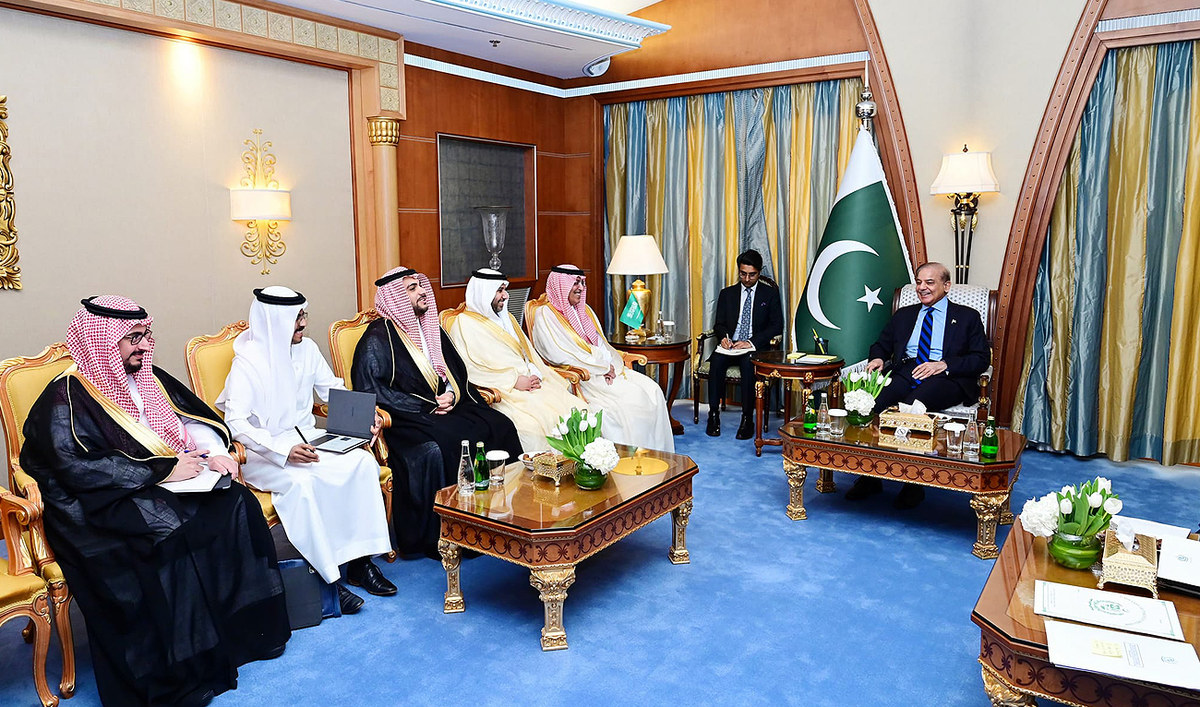
The Saudi investment minister acknowledged PM Sharif’s efforts for Pakistan’s growth and prosperity.
“A delegation of Saudi investors will soon visit Pakistan,” he was quoted as saying by Sharif’s office.
“Pakistan is our priority in terms of investment. Both sides will continue to fully cooperate in agriculture, information technology (IT) and energy sector.”
Pakistan and Saudi Arabia enjoy strong trade, defense and cultural ties. The Kingdom is home to over 2.7 million Pakistani expatriates and serves as the top source of remittances to the cash-strapped South Asian country.
Both Pakistan and Saudi Arabia have been closely working to increase their bilateral trade and investment, and the Kingdom recently reaffirmed its commitment to expedite an investment package worth $5 billion discussed previously with Islamabad.
In his meeting with the prime minister, Saudi Arabia’s Industry and Mineral Resources Minister Bandar Alkhorayef expressed “deep interest” in cooperation with Pakistan in agriculture, minerals, IT and other sectors, according to Sharif’s office.
“I am in touch with Saudi private companies regarding investment in Pakistan and [representatives of] these companies will visit Pakistan very soon,” the Saudi minister was quoted as telling PM Sharif.
“Cooperation between private sectors of the two countries is among our top priorities.”
PM Sharif thanked Saudi Arabia’s King Salman and Crown Prince Mohammed bin Salman as well as the Saudi ministers for supporting Pakistan in every difficulty.
“During my previous government, our economic situation improved, thanks to Saudi Arabia’s support and assistance,” he said, describing both countries as strategic partners.
Pakistan’s Foreign Minister Ishaq Dar, Finance Minister Muhammad Aurangzeb and other members of PM Sharif’s cabinet were also present at the meetings.










